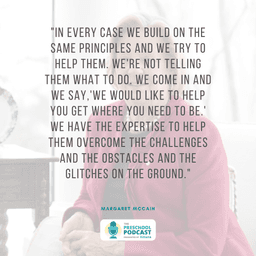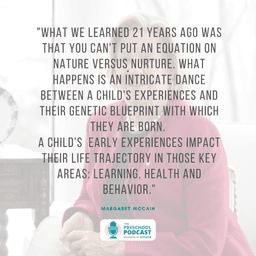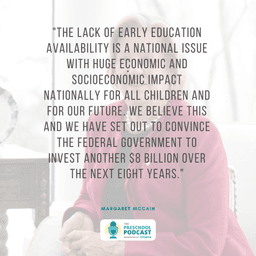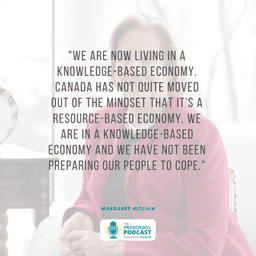The Economic Impact of Investment in the Early Years
Episode 192 – The Early Years Study 4 report revealed that Canada ranks 33rd out of 35 of OECD countries for the number of young children who regularly attend an ECE program. In this episode, we host Mrs. Margaret McCain, author of the report, for a discussion on the long-term socioeconomic consequences of underinvesting in ECE. We also talk about how the early years affects the economy and how much the Canadian Federal Government would need to invest to bring enrolment rates up to the average for OECD countries.
Resources:
- Margaret and Wallace McCain Foundation Website
- The Early Years Study 4: Thriving Kids, Thriving Societies Report
Episode Transcript
Margaret McCAIN:
In every case we build on the same principles and we try to help them. We’re not telling them what to do but we come in and we say, “We would like to help you get where you need to be.” We have the expertise to help them overcome the challenges and the obstacles and the glitches on the ground.
Ron SPREEUWENBERG:
Margaret, welcome to the Preschool Podcast!
McCAIN:
Thank you, thank you!
SPREEUWENBERG:
Today, we’re delighted to have on the show Margaret McCain. She’s a philanthropist and former lieutenant governor of New Brunswick in Canada. She’s also the author of Early Years Study 4: Thriving Kids, Thriving Societies. She has devoted a lot of her time in life towards early-childhood education and supporting the important work here. Let’s start off, Margaret, learning a little bit about you and your background and the foundation that you started, the Margaret and Wallace McCain Family Foundation.
McCAIN:
Right, which, in addition to being the author of Early Year Study 4, we can go back to 1999 where I coauthored with Dr. [James] Fraser Mustard the first Early Years study and report, followed by the second one in 2007 and a third one in 2011.
So, I’m now chairing the Margaret and Wallace McCain Family Foundation, which actually is committed to the implementation of the results, the recommendations on the action plan that has come out of those four Early Years reports. So, in a nutshell, that’s what we do.
SPREEUWENBERG:
And for those of our listeners who might not know, who is Dr. Frasier Mustard?
McCAIN:
Dr. Fraser Mustard, well, he died in 2011, but he was an international expert and authority, a medical doctor, former dean of medical school at McMaster University, former president of the Canadian Institute for Advanced Research.
And then following his retirement from those two organizations he established what they called the Founders’ Network. And out of that grew the request by the former premier, Michael Harris, to do an early years study, [Early Years Study] One, 1998 – the report came out in ’99. But he was recognized internationally as an authority on early child development.
And over these past 21 years, what has evolved is the current science and information and action plan that you see in the Early Years Study 4: Thriving Kids, Thriving Societies.
SPREEUWENBERG:
Yeah, so that was kind of what I was going to ask you, was you’ve been studying this for 20 years. And so what has been the evolution from what you were thinking about and researching and documenting 20 years ago, versus where we are today?
McCAIN:
Well, 20 years ago we were building on, we were working on what was emerging: it was a very strong science about early brain development, early human development and the impact on children’s lives and their outcomes, the critical importance of the first 2,000 days of life. And in that period the foundations are laid for their learning, for their health, for their behavior and sets a life trajectory for it for each individual child on their experiences.
What we learned back 21 years ago was that there is really… you can’t put an equation on nature versus nurture. What happens is an intricate dance between a child’s experiences on the genetic blueprint with which they are born. So, their early experiences impact hugely on their life trajectory in those key areas: learning, health and behavior.
The science that we had in 1999 has just become stronger and stronger and stronger. And the evidence of that is in each successive Early Years report. The first Early Years report, really on the insistence of Dr. Mustard – and we have to lay all the credit to him; we all follow suit – was that he insisted on one year [of] parental leave.
So, what young families and parents accept as a right today was not a right. That came out of the out of Early Years Study 1 and was the insistence and perseverance of Dr. Mustard. He said, “That is going to happen.” Well, a lot of people thought that it would spook governments. But in fact, every government across Canada adopted it quickly. Within a year we had one year parental leave established in legislation.
So, that was one big outcome. The other big outcome that came out of the first Early Years study was the importance of universality. And if we’re going to make a difference in childrens lives, we have to make things equal for all children.
So, this has taken 21 years to get to the recommendation we have today, which is a plan going that we’re going to take to the federal government so that we hope that we can make an equal opportunity through the public school system for all children, not just a few.
SPREEUWENBERG:
And so let’s talk more about that now. So, in the latest study, we’re talking about a large investment. And can you talk a little bit more about the dollar value of that investment and why it is that number and sort of what the anticipated impact or implications of that would be?
McCAIN:
Oh, yes, certainly. Today the provinces are doing the heavy lifting. The federal government did come in in the past two years with a small investment and that has certainly helped; it’s helped a lot. So, the federal government today… well, first of all, the total amount being spent on early-childhood education is $12 billion [$12B] and that’s across Canada. And the provinces are doing the heavy lifting. Out of that $12B, the federal government spends $1.2 [billion].
But this is a hugely national issue with huge economic [and] social-economic impact nationally for all children and for our future. So, we believe – and we’re set out to convince the federal government – to invest another $8 billion over the next eight years. We’re suggesting they do it $1 billion a year at a time until they reach the international average, the OECD [Organisation for Economic Co-operation and Development] average.
We’re not even close yet, you see. So, today we are categorized in the bottom third of OECD countries – that’s Western-industrialized countries. We’re in the bottom third. In fact, they say we’re 33 out of 35. So, the additional $8 billion will only take us up to the average international average.
SPREEUWENBERG:
Wow, that’s quite shocking information. And I have a stat in front of me here that an OECD average for early-childhood education enrollment is 70%. And so what does that mean? Does that mean children that are in childcare programs with a strong educational component?
McCAIN:
Le me see, the 70% would take us up to probably most four- and five-year-olds; that wouldn’t even get us down to three-year-olds and two-year-olds. So, we’re hoping that to get to 70% of four- or five-year-olds with the additional $8 billion.
SPREEUWENBERG:
Wow. And is there any coverage in the study of how that money might be deployed? Because that’s the one thing that I always kind of wonder in my head, not being as close to this topic as others like yourself, is I totally get the benefit of the additional investment – that seems very clear to me. But where it’s a little less clear is sort of, like, how that money could best be deployed into a system that’s been operating in its current state for a many number of years.
McCAIN:
Okay, how is that money going to be spent? Bear in mind that each individual province is going to spend it in their way, in how they want to implement additional public school education for their children, how they’re going to do it.
So, right now, Ontario, until the last year, was the only jurisdiction in North America that had two years of preschool education – that’s junior kindergarten and senior kindergarten. Nova Scotia and the Northwest Territories have added a junior kindergarten for four-year-olds.
Other provinces are looking at it, like P.E.I., Quebec, New Brunswick, Newfoundland are looking at it. B.C. is beginning to look at it, too, as well. How they’re doing it, they’re doing it differently. New Brunswick so far is doing it through a rollout of children’s centers across the province. Now, theirs will go down and capture two-year-olds. Nova Scotia has just pulled in four-year-olds, as Ontario has.
What we do know is, and what we’re saying loudly, is that the more days and more years, the more days, the more hours children have in preschool education, the better their learning, their literacy and numeracy, the better their social development. So, they benefit hugely by the increase in hours, days, years in preschool education.
But we’ll have to leave it to the provinces. We strongly recommend universality, that they not target [and specific demographic], that this issue for all children, for all children across the board. Whatever they do has to be for all children. How they do that, we have to leave it to them. We tried to stick with certain principles and we really emphasize very strongly play-based curriculum. So, we adhere to strong recommendations. But then we have to say, “Okay, you do it in the way you feel you could do it best within your financial constraints, etc.”
But remember, education is a provincial jurisdiction, so you can only go so far. Now, the federal government will find a way through social transfers to help them get where they need to be. And we provide expertise through the people on our foundation board that work with us. My program director and the Fellow [in Early Childhood Policy], Kerry McCuaig, from Atkinson Center [for Society and Child Development]. So, we provide help with them in their implementation of the principles.
SPREEUWENBERG:
Interesting. So, it’s kind of going through the provinces, is what I’m hearing and so that makes sense. And so it’s sort of like sort of how they decide to best deploy, is a little bit within their decision-making authority?
McCAIN:
Right, and just bear in mind, that’s where we’re very active with six provinces. We’ve less voice here now in Ontario – Doug Ford isn’t as tuned into preschool education as we would like him to be. But we have been very active, going way back to [Premiers] Dalton McGuinty and Kathleen Wynne in Ontario. And that’s why we have full-day kindergarten, which was a recommendation that came out of Early Years Study 2.
So, we’ve been very active as a foundation in six provinces from Ontario [to the] East and now increasingly so in Northwest Territories and British Columbia. We began conversations with Saskatchewan last summer. So, we are actually in conversation with 8 out of 10 provinces plus the territories.
And in every case we build on the same principles and we try to help them. We’re not telling them what to do but we come in and we say, “We would like to help you get where you need to be.” We have the expertise to help them overcome the challenges and the obstacles and te glitches on the ground.
SPREEUWENBERG:
So, one of the things I’m trying to figure out is, I’m trying to align the fact that Canada isn’t really measuring up globally relative to some of these OECD averages and measures. Yet, sort of anecdotally, being really involved in early-childhood education, there’s quite a few other countries and jurisdictions [who] would look to Canada and say, “Hey there, Canada’s quite progressive, as far as early-childhood education.” How do you sort of rectify those two different points of view?
McCAIN:
I’m going to give you an anecdote, a personal experience. A year and a half ago, I was in one province – and this could apply to quite a few provinces, particularly in the east. We were presenting the results of some research that we had done on 3-to-5-year-olds from high-risk circumstances. And we had done this with some government help, as well. So, we were presenting the results of the research. And we did it to a group of deputy ministers and later to a group of ministers and also to the to the media.
One of the deputy ministers came up to me and said, “Mrs. McCain, I’m going to tell you something which most people will deny around me. And we don’t have hard figures because there’s a lot of denial. But I can tell you, almost 50%of our high school graduates in this province are leaving with a general certificate, which means they are not literate or numerate. Those graduates cannot operate a piece of high tech equipment in a factory or drive a high tech truck. Twenty years ago, they could find menial jobs and be able to earn a meaningful wage to support their families; they can’t today. It’s a high tech world; it’s a knowledge-based economy and we are not educating them to cope.” Does that answer your question?
SPREEUWENBERG:
Yeah, it’s interesting. And I do suspect, too – I think you’re clearly very involved that the provincial levels as well – is that it is highly variable province-to-province in terms of the quality in what’s happening. And I know, for example, in Canada – in Quebec [specifically] they’re doing something very unique.
McCAIN:
You mean the Quebec province versus the rest of Canada?
SPREEUWENBERG:
Correct.
McCAIN:
Yes, they have. They did and they laid the groundwork 21 years ago with a very, very progressive family policy. And that’s been very, very good. They rolled out daycare centers across the province and charged just a minimal fee. Now, they didn’t charge enough to be able to cope with the need because it was hugely popular and put a lot of women back to work and did a lot to eliminate child poverty.
Now, that was 21 years ago, 22 years ago. Where they really didn’t… it has some weaknesses. Because of its popularity the ones who needed it the most weren’t getting there to access it. And there weren’t enough spaces. So, what grew up around it was a lot more home care and a lot more on a not-for-profit or for-profit childcare. It didn’t evolve with the same strengths that we expected it to.
So, a lot of the vulnerable children weren’t getting it, number one. Number two, they weren’t, because of the constraints on funding, they weren’t introducing all the stimulation pieces in the curriculum that they needed to. So, they have had to take a good, hard look at it. It’s wonderful; the groundwork is there and it just needs to be refreshed and strengthened.
And they are looking at putting four-year-olds in their school system. They realize now they need to do more to make it more available, accessible, affordable for all children. And they need to do more in terms of learning pieces.
SPREEUWENBERG:
Yeah, and I guess that’s one of the good things coming out of that, is there’s a lot of learnings that can be applied for other provinces.
McCAIN:
Absolutely. So, I’m not criticizing them. I’m just saying nothing ever stays the same; nothing can ever be stagnant. You have to keep refreshing. Whatever you introduce or implement has to be refreshed, reviewed, researched, reevaluated.
SPREEUWENBERG:
Yeah, totally. And they’re ahead of the curve, it sounds like, so of course, the first time you do anything it’s going to be… there’s learnings from that.
McCAIN:
Anytime we work with provinces and they manage to implement something, we say, “Look, okay, that’s not the end, you know. This is the beginning; this is just the beginning. So, don’t ever think about this being the end. It’s an ongoing thing. Education has to be ongoing to meet the current needs.”
And that’s another thing, you see: we are now living in a knowledge-based economy. Canada has not quite moved out of the mindset that it’s a resource-based economy. We are in a knowledge-based economy and we have not been preparing our people to cope.
SPREEUWENBERG:
Yeah, that’s a really insightful sort of macro point on all of this, which makes a lot of sense. Let’s say we up securing this $8 billion of funding. How would we then go to the federal government and say, “This has had a successful impact or the impact that we want it to.” How would we measure that? I know in the in in the U.S., for example, there’s the Head Start program, which the federal government has invested in. And there are some pros and cons to how we measure the impact of investment in early-childhood education and what that means.
McCAIN:
Well, we have a wonderful evidence-based measure called the Early Child Development Instrument, which we really want provinces to roll out and implement. And we can use that as a baseline to see what happens every few years, the improvement in children as they come into the school system.
And then, of course, as they get into primary school, there are going to be many different ways of measuring, measuring with evidence-based measures – EQAO [Education Equality and Accountability Office testing], for one, in Ontario. There will be many different ways of measuring once they get into the school system to see how they’re performing.
But we do have the Early Child Development Instrument, which is implemented not every year. And it’s not a not an individual measure; it’s a community based-measure, population-based measure. And the data is accumulated or acquired by classroom teachers for four-year-olds or five-year-olds after they’ve been with them for about four or five months.
And it measures children on five different categories. And it’s an evidence-based measure and we just want all the provinces to do it, use it as a baseline and just see what happens over time. And as they say, it’s a population-based measure to see how well our children are prepared for school, getting into school.
SPREEUWENBERG:
So, is it safe to say there’s sort of some short-term measures we can get with something like the Early [Child] Development Instrument? And there’s also some medium-to-longer-term measurements that we can use to see how they’re progressing, sort of like years later as they go through school?
McCAIN:
We have here in Ontario at the Institute for Child Studies at the University of Toronto, they have a wonderful research department where they are measuring already in full-day kindergarten. They have wonderful measures already in place. So, I’m turning that over to all the researchers, the academic researchers in education. They’re already doing it!
SPREEUWENBERG:
Yes, yes, absolutely. Okay, so, wow, this is super interesting and also really illuminating in terms of the depth and insightfulness of this research study in thinking about things at the scale of, “Are we preparing people for a life in the economy that we’re in now?” And I think that’s a really… that’s the kind of thinking we need to have in early-childhood education, is, like, these macro impacts that are so impactful, both for a country and an economy, but then also for those individual children at a human level and the impact that will have on their life.
This is great work. And I just want to say thank you. Thank you, Margaret, for all the work that you’ve done over the years with these studies that are so instrumental and so important, even personally. My wife and I will thank you for your study giving my wife, which is now an 18 month [maternity] leave, which has been… we couldn’t imagine it any other way now, you know?
McCAIN:
Well, thank you. I appreciate it and I like to be thanked but, I mean, my reward will come from better outcomes for children in Canada, which will impact… I’m 85 years old, but this will impact 85-year-olds as well. It will impact our society and our economy going forward.
SPREEUWENBERG:
Totally. And so if I’m listening to the Podcast and I want to learn more about the study or the Margaret and Wallace McCain Family Foundation and the other studies that you’ve done or the work that you’re doing, where can I go to get more information?
McCAIN:
We have a website, Margaret and Wallace McCain Family Foundation website, and it’ll get better and better.
SPREEUWENBERG:
Awesome. And I have here in front of me that website address being www.MWMcCain.ca. And it looks like you also have another website with all of the Early Year studies, which is www.EarlyYearsStudy.ca. So, if you’re listening to this podcast episode, definitely go look at those studies there. They’re very well done and clearly are having a real impact in the world we’re living in.
So, thank you again. And we’ll be working together as an early-childhood community to help move these important initiatives forward.
McCAIN:
Thank you. And I want to thank you because you’re enormously helpful to us!
Carmen is the Marketing Coordinator and Preschool Podcast Manager on the HiMama team. She's been working with childcare business owners and consultants for 3 years. She is passionate making connections that empower the ECE Community through knowledge-sharing to support better outcomes for children, their families, and society!
More by Carmen
Carmen Choi
March 13th, 2020
23 mins
Related Articles

The Benefits of Loose Parts Play for Young Children
December 10th, 2025 | Maddie Hutchison




